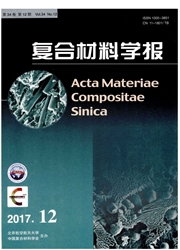

 中文摘要:
中文摘要:
The influence of aryl amide compounds(TMB)as b-nucleating agents, on the non-isothermal crystallization of a wood-flour/polypropylene composite(WF/PP)prepared by compression molding was investigated by wide-angle X-ray diffraction and differential scanning calorimetry. TMB was proved to be an effective b-crystalline nucleating agent for WF/PP. The DSC data showed that the crystallization peak temperature(Tp) increased and the half-time(t1/2) decreased with the addition of TMB.Three theoretical models were used to analyze the nonisothermal crystallization process. The modified Avrami method and Mo method successfully explained the nonisothermal crystallization behavior of PP and its composites. Their activation energies for non-isothermal crystallization were determined basing on the Kissinger method.
 英文摘要:
英文摘要:
The influence of aryl amide compounds(TMB)as b-nucleating agents, on the non-isothermal crystallization of a wood-flour/polypropylene composite(WF/PP)prepared by compression molding was investigated by wide-angle X-ray diffraction and differential scanning calorimetry. TMB was proved to be an effective b-crystalline nucleating agent for WF/PP. The DSC data showed that the crystallization peak temperature(Tp) increased and the half-time(t1/2) decreased with the addition of TMB.Three theoretical models were used to analyze the nonisothermal crystallization process. The modified Avrami method and Mo method successfully explained the nonisothermal crystallization behavior of PP and its composites. Their activation energies for non-isothermal crystallization were determined basing on the Kissinger method.
 同期刊论文项目
同期刊论文项目
 同项目期刊论文
同项目期刊论文
 期刊信息
期刊信息
